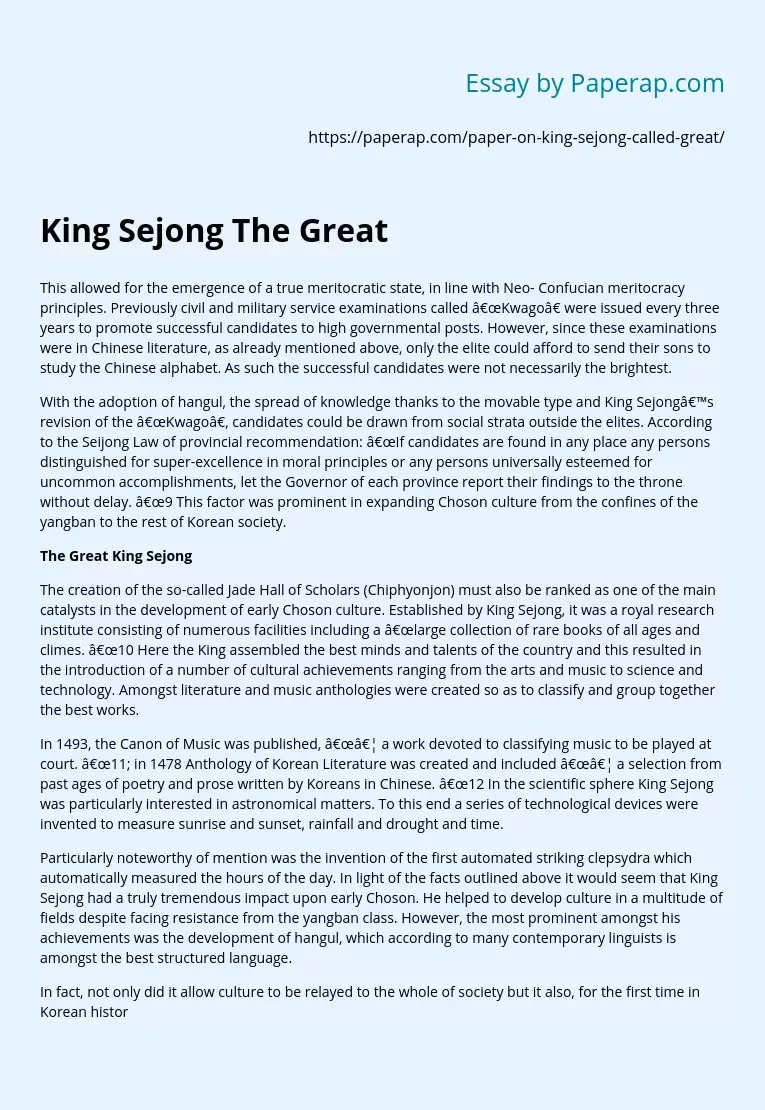King Sejong The Great
The following sample essay talks about Sejong, also Sejong-taewan is the 4th wang of the Korean state of Joseon. To read the introduction, body, and conclusion of the essay, scroll down.
This allowed for the emergence of a true meritocratic state, in line with Neo- Confucian meritocracy principles. Previously civil and military service examinations called “Kwago” were issued every three years to promote successful candidates to high governmental posts. However, since these examinations were in Chinese literature, as already mentioned above, only the elite could afford to send their sons to study the Chinese alphabet.
As such the successful candidates were not necessarily the brightest.
With the adoption of hangul, the spread of knowledge thanks to the movable type and King Sejong’s revision of the “Kwago”, candidates could be drawn from social strata outside the elites. According to the Seijong Law of provincial recommendation: “If candidates are found in any place any persons distinguished for super-excellence in moral principles or any persons universally esteemed for uncommon accomplishments, let the Governor of each province report their findings to the throne without delay.
“9 This factor was prominent in expanding Choson culture from the confines of the yangban to the rest of Korean society.
The creation of the so-called Jade Hall of Scholars (Chiphyonjon) must also be ranked as one of the main catalysts in the development of early Choson culture. Established by King Sejong, it was a royal research institute consisting of numerous facilities including a “large collection of rare books of all ages and climes.
“10 Here the King assembled the best minds and talents of the country and this resulted in the introduction of a number of cultural achievements ranging from the arts and music to science and technology. Amongst literature and music anthologies were created so as to classify and group together the best works.
In 1493, the Canon of Music was published, “… a work devoted to classifying music to be played at court. “11; in 1478 Anthology of Korean Literature was created and included “… a selection from past ages of poetry and prose written by Koreans in Chinese. “12 In the scientific sphere King Sejong was particularly interested in astronomical matters. To this end a series of technological devices were invented to measure sunrise and sunset, rainfall and drought and time.
Particularly noteworthy of mention was the invention of the first automated striking clepsydra which automatically measured the hours of the day. In light of the facts outlined above it would seem that King Sejong had a truly tremendous impact upon early Choson. He helped to develop culture in a multitude of fields despite facing resistance from the yangban class. However, the most prominent amongst his achievements was the development of hangul, which according to many contemporary linguists is amongst the best structured language.
In fact, not only did it allow culture to be relayed to the whole of society but it also, for the first time in Korean history, allowed the country as a whole to develop linguistic culture independently from China (up until then linguistic traits were either imported directly or mimicked from the latter). Furthermore, it aided the creation of entirely new fields of learning such as poetry and facilitated the promulgation of existing and newly acquired knowledge alike.
King Sejong The Great. (2019, Dec 05). Retrieved from https://paperap.com/paper-on-king-sejong-called-great/

